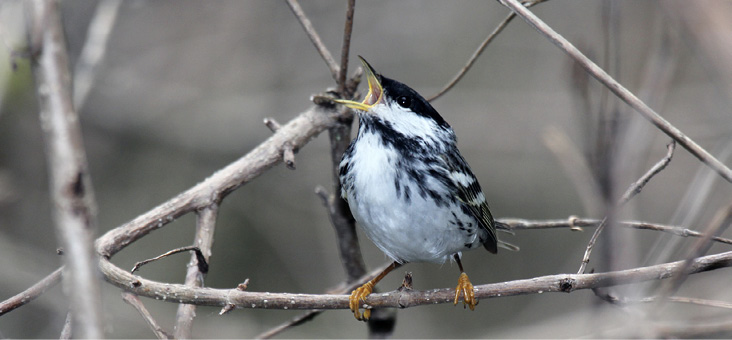Martha Steele

Blackpoll Warbler. Photograph by “WarblerLady.” (https://flickr.com/photos/warblerlady/8482742795/). (CC BY-ND 2.0)
Alvin and I were walking on a rural road near our Vermont home on a cool, late May morning when I heard a short, weak song from my left. Listening for several minutes, I was not sure which bird was singing it. I pulled out my phone and recorded the song to play later to my husband, Bob Stymeist. Alvin and I continued walking until Bob came by in the car on his way to the town transfer station and picked us up. I told him about the bird and played the recording back to him before we started off. Despite amplification of the song from the recording, Bob could not hear the bird. I asked if he had his hearing aids on, to which he replied no, as he was just planning to go to the transfer station and return home. We chuckled, shook our heads, and reminded ourselves again that if you are a birder, it is best never to leave home without your binoculars or, in this case, your hearing aids.
Back at the house, Bob easily heard the song from the phone’s recording after he put his hearing aids on. It was another striking example of how much benefit the hearing aids have been to Bob in the past few years. As we age, many of us start to lose our ability to hear the higher-pitched, or high-frequency, sounds where many bird songs, particularly those of warblers, reside. We may retain for a much longer time excellent hearing in the frequency range of human speech and may not realize that hearing aids could benefit us for specific situations, such as birding, even if most of the time we do not need them. Because birding is so much a function of using what you hear to locate a bird and thus have the opportunity to see it, the loss of the ability to hear birds is a profound one for older birders.
It took Bob time to decide to try hearing aids. He was growing increasingly frustrated during spring migration at not hearing what other birders were calling out. His frustration resulted in a palpable and negative effect on his enjoyment of birding or even on his desire to bird with others. This in turn made it more difficult for me, as his usual birding partner, to enjoy birding with him. The joy of spring migration was turning into discouragement about not hearing the birds and thus not locating them or even knowing they were there. I tried to explain to him that his frustration was affecting me as well and asked him to please make an appointment with an audiologist to see whether hearing aids might help. He certainly had nothing to lose, as most new purchases of hearing aids include the provision of returning them within a specified time for a full refund if you do not feel they are helpful.
For Bob, I was of course a daily reminder of how hearing devices can improve one’s quality of life. I was also an example of how one can go from not hearing birds at all to hearing them well, as was my experience after receiving cochlear implants. Bob finally made an appointment with an audiologist to explore whether hearing aids could help him hear his birds.
Bob went prepared to the audiology appointment. Most patients visiting an audiologist need amplification to better understand speech, which is largely at lower frequencies than bird songs. But Bob’s hearing in the range of human speech was excellent, so it was important that the audiologist understand what Bob was looking for. He played songs from several species, such as the Cape May Warbler, Brown Creeper, Golden-crowned Kinglet, Blue-winged Warbler, and Blackpoll Warbler. He told the audiologist, “This is what I want to hear.” With Bob’s description and recordings, the audiologist was able to program the hearing aids to amplify the higher frequencies. She adjusted the program until Bob could hear those birds with the hearing aids.
Bob is a different birder now with his hearing aids and a far happier one. We can walk down our driveway in Vermont, and he hears the Brown Creeper, the Golden-crowned Kinglet, the Blackburnian Warbler, the Northern Parula, and the Eastern Wood-Pewee deep into the forest. Hearing aids may not help every birder losing the higher pitches, but they are certainly worth exploring, as they can make all the difference in your enjoyment of birding.
Bob does not wear his hearing aids most of the time, only when he birds. At first, I was skeptical that he could get much benefit if he did not wear the aids all the time, as it takes some getting used to the increased amplification of sound with a hearing device. But he easily benefits from the aids while birding, and just as easily can remove them for normal, day-to-day activities and conversation. His hearing devices are now just another thing that he has to check off before he goes birding: does he have his phone, his camera, his binoculars, his scope, and last but certainly not least, his hearing aids? I am just so happy that he can hear his birds again, which is especially critical for songbirds inhabiting thick forest edges and interiors where hearing a bird is far easier than seeing one. Oh, how we relish our return to debating who just sang.
Martha Steele, a former editor of Bird Observer, has been progressively losing vision due to retinitis pigmentosa and is legally blind. Thanks to a cochlear implant, she is now learning to identify birds from their songs and calls. Martha lives with her husband Bob Stymeist, in Arlington. Martha can be reached at marthajs@verizon.net.